Index relies entirely on the support of donors and readers to do its work.
Help us keep amplifying censored voices today.
Mr. Zeid Ra’ad Al Hussein, Mr. David Kaye, Mr. Joseph Cannataci, Mr. Maina Kiai, Mr. Michel Forst, Ms. Faith Pansy Tlakula, and Ms. Reine Alapini-Gansou
cc: African Union
African Peer Review Mechanism (APRM) Secretariat
Common Market for Eastern and Southern Africa Secretariat
Domestic & International Election Observer Missions to the Republic of Uganda
East African Community Secretariat
International Conference on the Great Lakes Region Secretariat
New Partnership for Africa’s Development (NEPAD) Secretariat
Uganda Communications Commission
Uganda Electoral Commission
Uganda Ministry of Information and Communications Technology
23 February 2016
Re: Internet shutdown in Uganda and elections
Your Excellencies,
We are writing to urgently request your immediate action to condemn the internet shutdown in Uganda, and to prevent any systematic or targeted attacks on democracy and freedom of expression in other African nations during forthcoming elections in 2016. [1]
On February 18, Ugandan internet users detected an internet outage affecting Twitter, Facebook, and other communications platforms. [2] According to the Uganda Communications Commission (UCC), blocking was carried out on orders of the Electoral Commission, for security reasons. [3] The shutdown coincided with voting for the presidential election, and remained in place until the afternoon of Sunday, February 21. During this period, two presidential candidates were detained under house arrest. [4] The telco MTN Uganda confirmed the UCC directed it to block “Social Media and Mobile Money services due to a threat to Public Order & Safety.” [5] The blocking order also affected the telcos Airtel, Smile, Vodafone, and Africel. President Museveni admitted to journalists on February 18 that he had ordered the block because “steps must be taken for security to stop so many (social media users from) getting in trouble; it is temporary because some people use those pathways for telling lies.” [6]
Research shows that internet shutdowns and state violence go hand in hand. [7] Shutdowns disrupt the free flow of information and create a cover of darkness that allows state repression to occur without scrutiny. Worryingly, Uganda has joined an alarming global trend of government-mandated shutdowns during elections, a practice that many African Union member governments have recently adopted, including: Burundi, Congo-Brazzaville, Egypt, Sudan, the Central African Republic, Niger, Democratic Republic of Congo. [8], [9], [10], [11], [12], [13], [14]
Internet shutdowns — with governments ordering the suspension or throttling of entire networks, often during elections or public protests — must never be allowed to become the new normal. Justified for public safety purposes, shutdowns instead cut off access to vital information, e-financing, and emergency services, plunging whole societies into fear and destabilizing the internet’s power to support small business livelihoods and drive economic development.
Uganda’s shutdown occurred as more than 25 African Union member countries are preparing to conduct presidential, local, general or parliamentary elections. [15]
A growing body of jurisprudence declares shutdowns to violate international law. In 2015, various experts from the United Nations (UN) Organization for Security and Co-operation in Europe (OSCE), Organization of American States (OAS), and the African Commission on Human and Peoples’ Rights (ACHPR), issued an historic statement declaring that internet “kill switches” can never be justified under international human rights law, even in times of conflict. [16] General Comment 34 of the UN Human Rights Committee, the official interpreter of the International Covenant on Civil and Political Rights, emphasizes that restrictions on speech online must be strictly necessary and proportionate to achieve a legitimate purpose. Shutdowns disproportionately impact all users, and unnecessarily restrict access to information and emergency services communications during crucial moments.
The internet has enabled significant advances in health, education, and creativity, and it is now essential to fully realize human rights including participation in elections and access to information.
We humbly request that you use the vital positions of your good offices to:
We are happy to assist you in any of these matters.
Sincerely,
Access Now
African Centre for Democracy and Human Rights Studies (ACDHRS)
Association for Progressive Communications (APC)
Article 19 East Africa
Chapter Four Uganda
CIPESA
CIVICUS
Committee to Protect Journalists
DefendDefenders (The East and Horn of Africa Human Rights Defenders Project)
Electronic Frontier Foundation (EFF)
Global Partners Digital
Hivos East Africa
ifreedom Uganda
Index on Censorship
Integrating Livelihoods thru Communication Information Technology (ILICIT Africa)
International Commission of Jurists Kenya
ISOC Uganda
KICTANet (Kenya ICT Action Network)
Media Rights Agenda
Paradigm Initiative Nigeria
The African Media Initiative (AMI)
Unwanted Witness
Web We Want Foundation
Women of Uganda Network (WOUGNET)
Zimbabwe Human Rights NGO Forum
Endnotes
[1] Uganda election: Facebook and Whatsapp blocked’ (BBC, 18 February 2016) <http://www.bbc.co.uk/news/world-africa-35601220> accessed 18 February 2016.
[2] Omar Mohammed, ‘Twitter and Facebook are blocked in Uganda as the country goes to the polls’ (Quartz Africa, 18 February 2016) <http://qz.com/619188/ugandan-citizens-say-twitter-and-facebook-have-been-blocked-as-the-election-gets-underway/> accessed 18 February 2016.
[3] Uganda blocks social media for ‘security reasons’, polls delayed over late voting material delivery (The Star, 18 February 2016) <http://www.the-star.co.ke/news/2016/02/18/uganda-blocks-social-media-for-security-reasons-polls-delayed-over_c1297431> accessed 18 February 2016.
[4] Brian Duggan, “Uganda shuts down social media; candidates arrested on election day” (CNN, 18 February 2016) <http://www.cnn.com/2016/02/18/world/uganda-election-social-media-shutdown/> accessed 22 February 2016.
[5] MTN Uganda <https://twitter.com/mtnug/status/700286134262353920> accessed 22 February 2016.
[6] Tabu Batugira, “Yoweri Museveni explains social media, mobile money shutdown” (Daily Nation, February 18, 2016) <http://www.nation.co.ke/news/Yoweri-Museveni-explains-social-media-mobile-money-shutdown/-/1056/3083032/-/8h5ykhz/-/index.html> accessed 22 February 2016.
[7] Sarah Myers West, ‘Research Shows Internet Shutdowns and State Violence Go Hand in Hand in Syria’ (Electronic Frontier Foundation, 1 July 2015)
<https://www.eff.org/deeplinks/2015/06/research-shows-internet-shutdowns-and-state-violence-go-hand-hand-syria> accessed 18 February 2016.
[8] ‘Access urges UN and African Union experts to take action on Burundi internet shutdown’ (Access Now 29 April 2015) <https://www.accessnow.org/access-urges-un-and-african-union-experts-to-take-action-on-burundi-interne/> accessed 18 February 2016.
[9] Deji Olukotun, ‘Government may have ordered internet shutdown in Congo-Brazzaville’ (Access Now 20 October 2015) <https://www.accessnow.org/government-may-have-ordered-internet-shutdown-in-congo-brazzaville/> accessed 18 February 2016.
[10] Deji Olukotun and Peter Micek, ‘Five years later: the internet shutdown that rocked Egypt’ (Access Now 21 January 2016) <https://www.accessnow.org/five-years-later-the-internet-shutdown-that-rocked-egypt/> accessed 18 February 2016.
[11] Peter Micek, ‘Update: Mass internet shutdown in Sudan follows days of protest’ (Access Now, 15 October 2013) <https://www.accessnow.org/mass-internet-shutdown-in-sudan-follows-days-of-protest/> accessed 18 February 2016.
[12] Peter Micek, ‘Access submits evidence to International Criminal Court on net shutdown in Central African Republic’(Access Now 17 February 2015) <https://www.accessnow.org/evidence-international-criminal-court-net-shutdown-in-central-african-repub/> accessed 18 February 2016.
[13] ‘Niger resorts to blocking in wake of violent protests against Charlie Hebdo cartoons.’ (Access Now Facebook page 26 January 2015) <https://www.facebook.com/accessnow/posts/10153030213288480> accessed 18 February 2016.
[14] Peter Micek, (Access Now 23 January 2015) ‘Violating International Law, DRC Orders Telcos to Cease Communications Services’ <https://www.accessnow.org/violating-international-law-drc-orders-telcos-vodafone-millicon-airtel/> accessed 18 February 2016.
[15] Confirmed elections in Africa in 2016 include: Central African Republic (14th February), Uganda (18th February), Comoros and Niger (21st February), Rwanda (22nd -27th February), Cape Verde (TBC February), Benin (6th-13th March), Niger, Tanzania and Congo (20th March), Rwanda (22nd March), Chad (10th April), Sudan (11th April), Djibouti (TBC April), Niger (9th May), Burkina Faso (22nd May), Senegal (TBC May), Sao Tome and Principe (TBC July), Zambia (11th July), Cape Verde (TBC August), Tunisia (30th October), Ghana (7th November), Democratic Republic of Congo (27th November), Equatorial Guinea (TBC November), Gambia (1st December), Sudan, and Cote d’Ivoire (TBC December). Other elections without confirmed dates are scheduled to occur in Sierra Leone, Mauritania, Libya, Mali, Guinea, Rwanda, Somalia, and Gabon.
[16] Peter Micek, (Access Now 4 May 2015) ‘Internet kill switches are a violation of human rights law, declare major UN and rights experts’ <https://www.accessnow.org/blog/2015/05/04/internet-kill-switches-are-a-violation-of-human-rights-law-declare-major-un> accessed 18 February 2016.
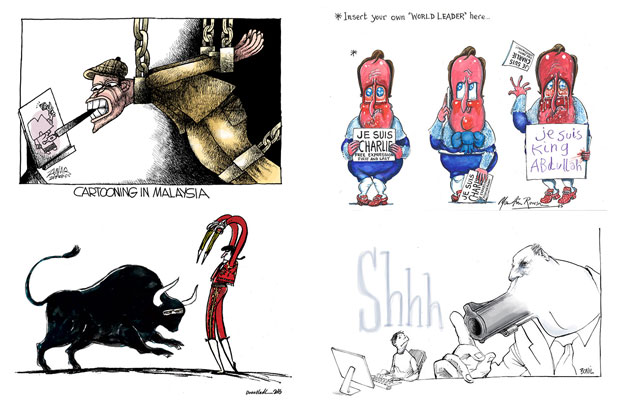
Among the cartoons available in the auction are original artworks by Zulkiflee Anwar Haque (Zunar); Martin Rowson; Xavier Bonilla (Bonil); and Doaa El Adl (clockwise from top left).
Index on Censorship is delighted to announce the auction of an incredible collection of cartoons that celebrate the power of art to challenge suppression. The auction will help fund our work supporting persecuted writers and artists worldwide.
Make a new donation to Index before the end of December to receive a limited-edition postcard set of 10 cartoons created by some of the world’s top political cartoonists
Earlier this year, Index commissioned 10 of the world’s leading cartoonists to pen a work on the theme of free expression. The cartoons are powerful tributes to the role of art, drawn by world-renowned artists from every continent: from a US Pulitzer Prize winner to a Syrian cartoonist beaten in retaliation for his work.
Beginning Tuesday, 24 November 2015, bidders will be able to enter bids for hand-drawn artwork by:
Xavier Bonilla (Bonil) – Ecuador
Regularly denounced, threatened and fined, Ecuador’s Bonil has earned the title “the pursued cartoonist” for his work. For 30 years he has critiqued, lampooned and ruffled the feathers of Ecuador’s political leaders, in the process earning a reputation as one of the wittiest and most fearless cartoonists in South America.
Kevin Kallaugher (Kal) – United States
US artist Kal is the editorial cartoonist for The Economist and The Baltimore Sun and his work has appeared in more than 100 publications worldwide including Le Monde, Der Spiegel, The International Herald Tribune, The New York Times, Time, Newsweek, and The Washington Post. He has won numerous awards, including the 2014 Grand Prix for Cartoon of the Year.
Signe Wilkinson (Signe) – United States
The first woman to win the Pulitzer Prize for Editorial Cartooning, Signe has won several other awards for her work. She comments on topical political issues and is best known for her daily cartoons in The Philadelphia Daily News.
Jean Plantureux (Plantu) – France
Plantu is the chief cartoonist for France’s Le Monde and founder of Cartooning for Peace, a global network of cartoonists. This drawing is a rare, signed copy of the world-famous cartoon Plantu drew for Le Monde the day after the attack on Charlie Hebdo.
Martin Rowson – UK
A former Cartoonist Laureate, political satirist Martin Rowson contributes cartoons to The Guardian and the Daily Mirror as well as Index on Censorship magazine. His work has earned him several awards, including the prize for the Best Humour and Satire Book of the Year at this year’s Political Book Awards.
Ali Farzat – Syria
Ali Farzat, a former Index on Censorship Freedom of Expression Award winner, came to global attention in 2011 when he was pulled from his car and beaten by Syrian security forces who broke both his hands. When Kuwaiti authorities closed the offices of his newspaper, Al-Watan, earlier this year Ferzat was forced to buy new materials and redrew this cartoon for us from scratch.
Doaa El Adl (Doaa) – Egypt
Doaa is a celebrated female artist in the Arab world – well know for her fearless political work. She has often tackled freedom of speech, human rights and women’s rights issues, wining numerous awards as well as controversy and even charges of blasphemy for her work.
Zulkiflee Anwar Haque (Zunar) – Malaysia
Zunar is an award-winning Malaysian political cartoonist who has been repeatedly targeted by authorities. Five of his cartoon books have been banned by the Malaysian government for carrying content “detrimental to public order” and thousands confiscated. He is currently facing up to 43 years in jail for mocking the government.
David Rowe – Australia
A three-time winner of the Stanley Award for Australia’s Cartoonist of the Year, David Rowe has worked for the Australian Financial Review for 22 years. Rowe’s bright and colourful watercolours are famously merciless.
Damien Glez – (Glez) – Burkina Faso
Glez’s cartoons regularly appear across three continents, including his own weekly satirical newspaper in Burkina Faso: Le Journal du Jeudi . He co-created pan-African monthly satirical Le Marabout, writes his own comic strip Divine Comedy and has won numerous awards internationally..
Bids must be placed by noon on Monday, 14 December 2015.
The auction is being hosted by Givergy.
His Excellency José Eduardo dos Santos
President of the Republic of Angola
Re: Prosecution of Rafael Marques de Morais
Dear President dos Santos,
We, the undersigned individuals and organizations, are writing to you to express our strong concerns about the prosecution on criminal defamation charges of journalist Rafael Marques de Morais. Despite what was understood to have been a negotiated agreement between Mr. Marques de Morais and government authorities late last week, we are deeply concerned that that agreement is now being reversed. Instead, it appears that the court will issue a verdict in the case later this week; a conviction could result in a prison sentence and the indefinite revocation of his passport.
This case reflects a broader deterioration in the environment for freedom of expression in Angola, including the increasing use of criminal defamation lawsuits against journalists and routine police abuse of, and interference with, journalists, activists, and protesters peacefully exercising their right to freedom of expression. We urge you to take immediate steps to reverse these worrying trends.
Mr. Marques de Morais has been regularly and repeatedly harassed by state authorities because of his work. The 24 criminal defamation charges lodged against Marques, for example, are only the latest attempt by Angolan officials to silence his reporting. Marques has alleged a range of high-level corruption cases and human rights violations in his blog, and pursued sensitive investigations into human rights violations in Angola’s diamond areas.[1] We are unaware of any serious effort by the Angolan attorney-general’s office to impartially and credibly investigate the allegations of the crimes for which he has been charged.
Your government appears to be using Angola’s criminal defamation laws to deter Mr. Marques de Morais from his human rights reporting. By doing so, the government is violating his right to freedom of expression as protected by Article 9 of the African Charter on Human and Peoples’ Rights and Article 19 of the International Covenant on Civil and Political Rights. Preventing him from reporting on human rights violations is contrary to the United Nations Declaration on Human Rights Defenders.
The prosecution of Mr. Marques de Morais also stands in opposition to the December 2014 judgment of the African Court on Human and Peoples’ Rights, which ruled in the case of Lohé Issa Konaté v. Burkina Faso that except in very serious and exceptional circumstances, “violations of laws on freedom speech and the press cannot be sanctioned by custodial sentences.”[2] Laws criminalizing defamation, whether of public or private individuals, should never be applied, including in these circumstances given that Marques was raising concerns about human rights abuses in the country’s diamond mines. Criminal defamation laws are open to easy abuse, as the case against Marques demonstrates, resulting in disproportionately harsh consequences. As repeal of criminal defamation laws in an increasing number of countries shows, such laws are not necessary for protecting reputations.
We strongly urge you to take immediate steps to make clear that the government of Angola respects the right of journalists, activists, and others to enjoy their right to freedom of expression. Furthermore we encourage you to immediately pursue efforts to abolish Angola’s criminal defamation laws.
Thank you for your attention to this important matter.
Sincerely yours,
Sarah Margon, Washington Director, Human Rights Watch
Steven Hawkins, Executive Director, Amnesty International USA
Teresa Pina, Executive Director, Amnesty International Portugal
A. Lemon, Emeritus Fellow, Mansfield College, University of Oxford
Aline Mashiach, Head Commercial and Marketing Manager, Royalife LTD
Andreas Missbach, Joint-managing director, Berne Declaration, Switzerland
Art Kaufman, Senior Director, World Movement for Democracy
Beata Styś-Pałasz, P.E. Senior Project Manager, State of Florida Department of Transportation
Ben Knighton, Co-ordinator of the African Studies Research Group, Oxford Centre for Mission Studies (OCMS)
Carl Gershman, President, National Endowment for Democracy
Cécile Bushidi, PhD student, SOAS, University of London
Cléa Kahn-Sriber, Head of Africa Desk, Reporters Without Borders
Cobus de Swardt, Managing Director, Transparency International
Daniel Calingaert, Executive Vice President, Freedom House
Deborah Posel, Institute for Humanities in Africa (HUMA), University of Cape Town
Diana Jeater, Editor, Journal of Southern African Studies, Lecturer in African History, Goldsmiths, University of London
Dorothee Boulanger, Doctoral candidate, King’s College London
Dylan Tromp, Director, Integrate: Business & Human Rights
E.A. Brett, Professor of International Development, London School of Economics
Ery Shin, Doctoral candidate in English literature, University of Oxford
Fiona Armitage
Garth Meintjes, Executive Director, International Senior Lawyers Project
Henning Melber, Senior Advisor/Director emeritus, The Dag Hammarskjöld Foundation
Hilary Owen, Professor of Portuguese and Luso-African Studies, University of Manchester
Jaqueline Mitchell, Commissioning Editor, James Currey
Jodie Ginsberg, CEO, Index on Censorship
Kathryn Brooks, African Studies Centre, University of Oxford
Kenneth Hughes, University of Cape Town
Lara Pawson, freelance writer, Author of In the Name of the People: Angola’s Forgotten Massacre
Lotte Hughes, Senior Research Fellow, History Department, and The Ferguson Centre for African and Asian Studies Faculty of Arts, The Open University
Margot Leger, MSc Student, African Studies
Mary Lawlor, Founder and Executive Director, Front Line Defenders
Matthew de la Hey, MBA Candidate, Saïd Business School, University of Oxford
Merle Lipton, Research Fellow, King’s College London
Michael Ineichen, Program Manager & Human Rights Council Advocacy Director, International Service for Human Rights (ISHR)
Michael Lipton, Research Professor of Economics, Sussex University
Michael Savage, Cape Town, South Africa
Michelle Kelly, Faculty of English, University of Oxford
Nic Cheeseman, Associate Professor in African Politics, Department of Politics and IR and the African Studies Centre, University of Oxford
Patrycja Stys, Co-Convenor, Oxford Central Africa Forum (OCAF), University of Oxford
Phil Bloomer, Executive Director, Business & Human Rights Resource Centre
Phillip Rothwell, King John II Professor of Portuguese, University of Oxford
Raymond Baker, President, Global Financial Integrity
Roger Southall, Professor Emeritus, Department of Sociology, University of the Witwatersrand
Santiago A. Canton, Executive Director of Partners for Human Rights, Robert F. Kennedy Human Rights
Simon Taylor, Director, Global Witness
Sue Valentine, Africa Program Coordinator, Committee to Protect Journalists
Suzanne Nossel, Executive Director, PEN American Center
William Beinart, Director, African Studies Centre, University of Oxford
CC:
Adão Adriano António, Attorney General of the Republic and supervisor of the central Huambo province
Lucas Miguel Janota, Magistrate of the Public Ministry
South America |
|
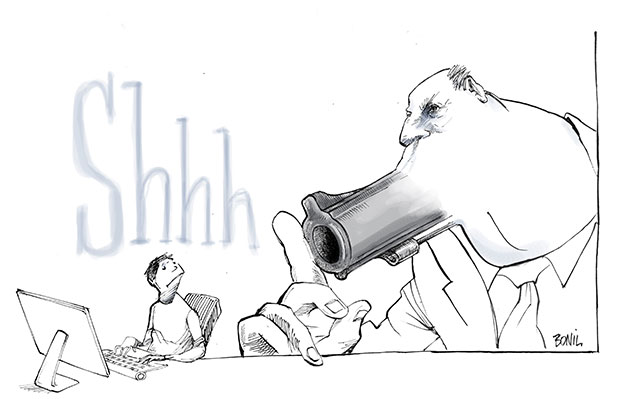
|
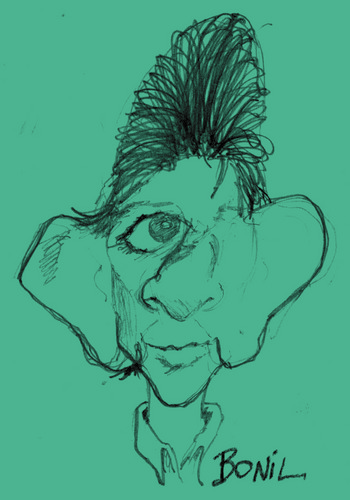
Xavier Bonilla (Bonil)EcuadorBonil has been criticising Ecuador’s political leaders in his cartoons for 30 years. Regularly denounced, threatened and fined, Bonil has earned the title “the pursued cartoonist”. @bonilcaricatura |
|
|
|
North America |
|
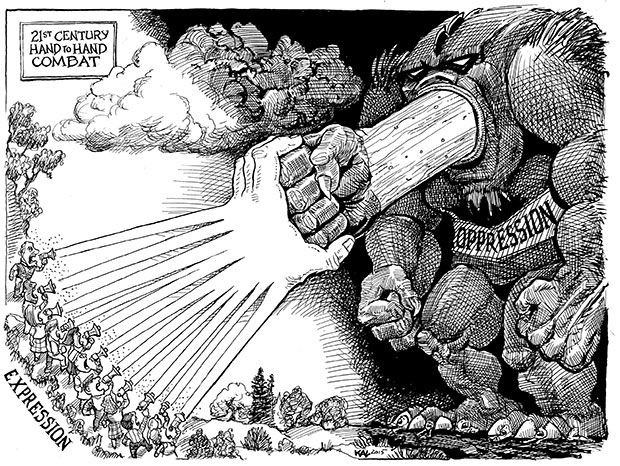
|

Kevin Kallaugher (Kal)United StatesUS artist Kal spent 10 years drawing cartoons in London before returning home, where he continues to work. He has won numerous awards and his cartoons have been featured in more than 100 publications around the globe. @kaltoons | web |
|
|
|
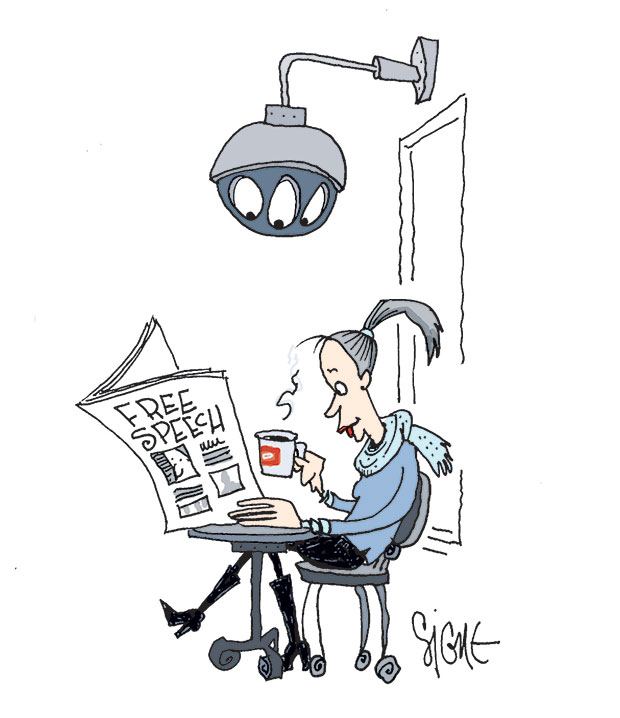
|
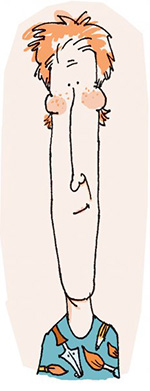
Signe Wilkinson (Signe)United StatesIn 1992, Signe became the first woman to win the Pulitzer Prize for Editorial Cartooning, and she has since won several other awards for her work. She comments on topical political issues and is best known for her daily cartoons in The Philadelphia Daily News. @SigneWilk | Facebook |
|
|
|
Europe |
|
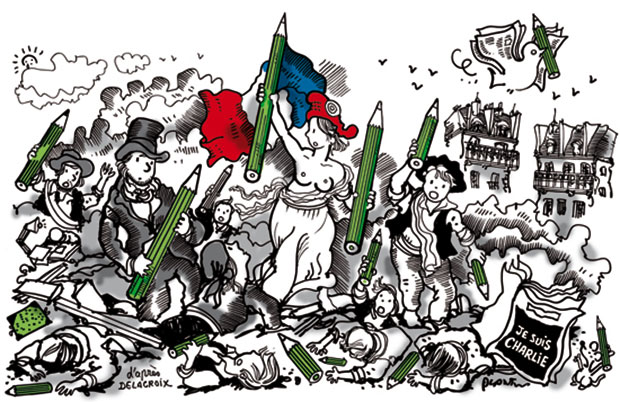
|
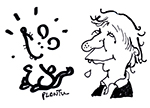
Jean Plantureux (Plantu)FrancePlantu, the chief cartoonist for France’s Le Monde, is co-founder of Cartooning for Peace. Since the Charlie Hebdo attacks, Plantu has had a constant security detail but says he intends to continue to draw. @plantu | web |
|
|
|
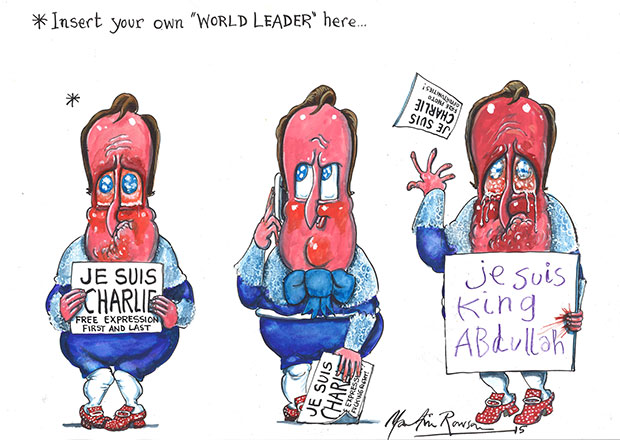
|
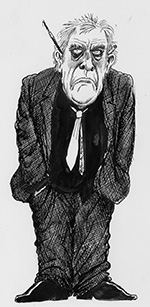
Martin RowsonUnited KingdomPolitical satirist Martin Rowson contributes cartoons to The Guardian and the Daily Mirror as well as Index on Censorship magazine. His work has earned him several awards, as well as an official appointment as Cartoonist Laureate of London in 2001. @MartinRowson |
|
|
|
Middle East |
|
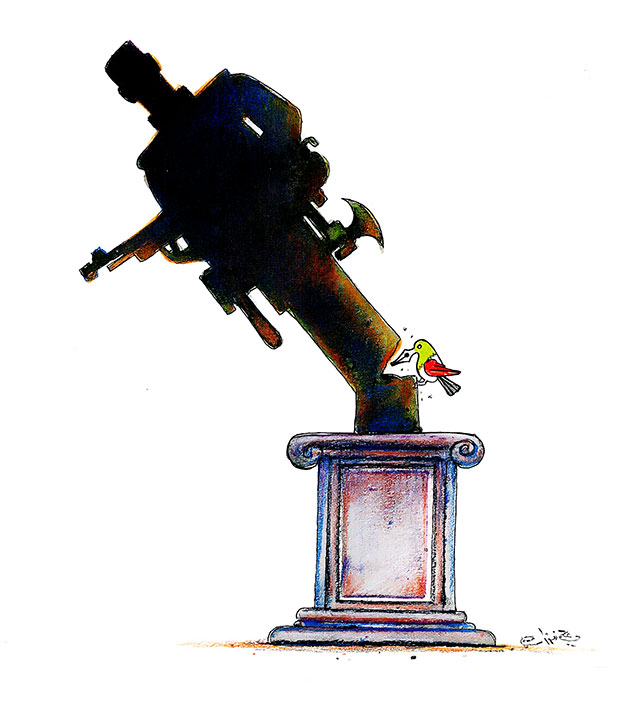
|
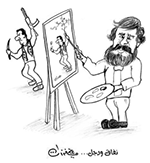
Ali FarzatSyriaFormer Index arts award winner Ali Farzat came to global attention in 2011, when he was pulled from his car and beaten by Syrian security forces who broke both his hands. Farzat recently worked for Kuwaiti Newspaper Al-Watan, which has been closed by authorities after criticising the government. |
|
|
|
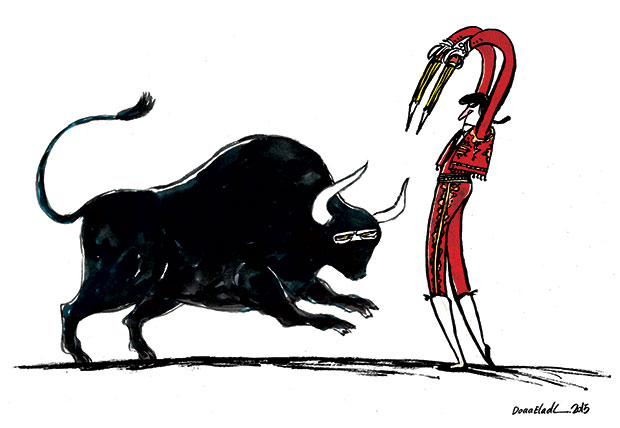
|
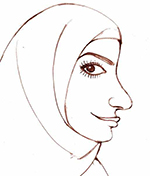
Doaa El AdlEgyptDoaa El Adl has been an award-winning cartoonist for prominent Egyptian newspaper Al Masry Al Youm since 2008. She has faced threats and charges of blasphemy for her illustrations. @doaaeladl |
|
|
|
Asia |
|
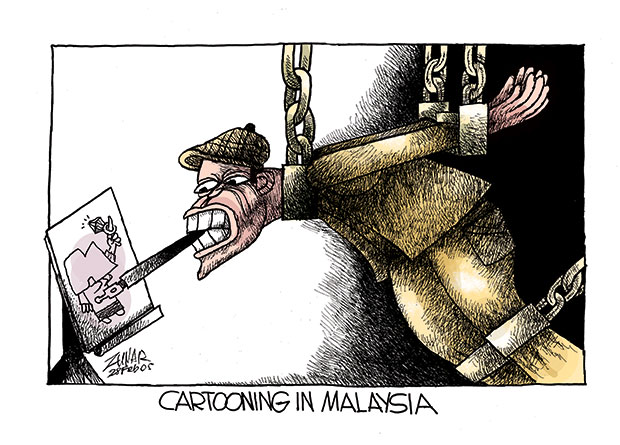
|
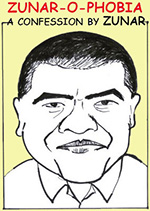
Zulkiflee Anwar Haque (Zunar)Malaysia“Why pinch when you can punch?!” says Zunar, believing the best way to make a political impact is to criticise his country’s powerful leaders as harshly as possible. The Malaysian government has banned much of Zunar’s work and repeatedly subjected him to raids, arrest and detainment. Zunar continues undeterred, despite two arrests in 2015 already. @zunarkartunis | web |
|
|
|
Australia |
|
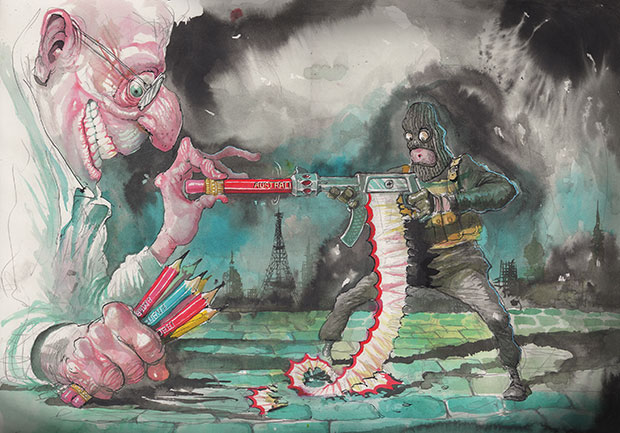
|
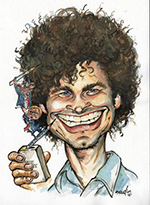
David RoweAustraliaAward-winning cartoonist David Rowe has worked as an editorial artist for the Australian Financial Review for 22 years. Rowe’s bright and colorful watercolors are famously merciless. He is a three-time winner of the Stanley Award for Australia’s Cartoonist of the Year. @roweafr |
|
|
|
Africa |
|
|
|
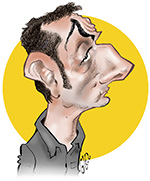
Damien Glez (Glez)Burkina FasoGlez’s cartoons regularly appear in publications spanning three continents, including Le Journal du Jeudi, for which he is the delegated director of publication, and the satirical Le Marabout, which he co-created. He writes his own comic strip called Divine Comedy. @DamienGlez | web |